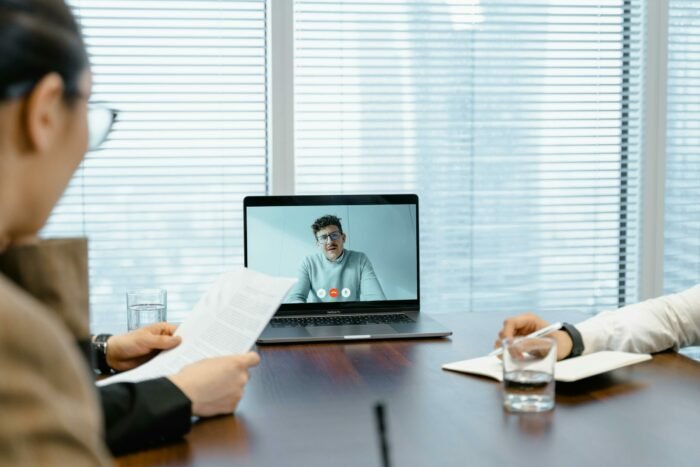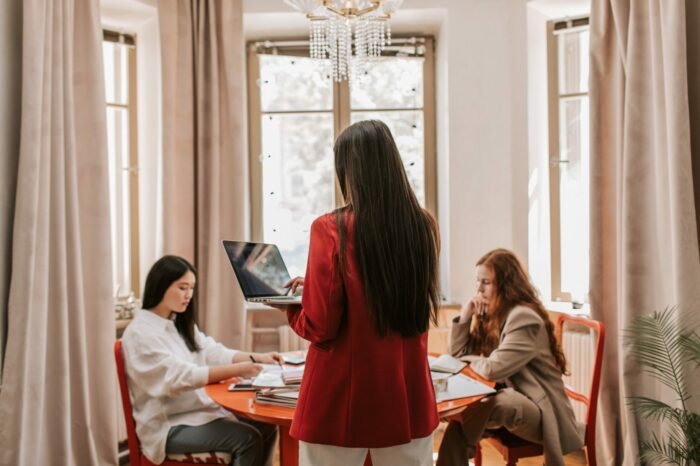Welcome to our blog post on how to improve interpersonal skills! Whether you’re a professional looking to enhance your communication abilities or simply someone who wants to foster better relationships, this article is for you. Interpersonal skills are the foundation of successful interactions, both in personal and professional settings. From active listening techniques to cultural sensitivity, we’ll explore various strategies that can help you become a master communicator. So, let’s dive right in and discover the key ingredients for building strong connections with others!
How to Improve Interpersonal Skills?
1. Active Listening Techniques for Effective Communication
Active listening is a crucial skill that can greatly enhance your communication abilities and improve your interpersonal relationships. It involves fully engaging with the speaker, paying attention to both their verbal and nonverbal cues, and demonstrating genuine interest in what they have to say:
- One effective technique for active listening is maintaining eye contact. By looking directly at the person speaking, you show them that you are focused on their words and value what they are saying. Additionally, nodding or providing small gestures of affirmation can convey understanding and encourage the speaker to continue sharing their thoughts.
- Another important aspect of active listening is avoiding distractions. Put away your phone or any other potential interruptions so you can give your full attention to the conversation at hand. This not only shows respect for the speaker but also allows you to better absorb information and respond thoughtfully.
- Paraphrasing or summarizing what the speaker has said is an excellent way to demonstrate comprehension and ensure clear communication. Restating key points in your own words shows that you have actively processed their message and encourages further dialogue.
- It’s essential to practice empathy during conversations. Putting yourself in the other person’s shoes allows you to understand their perspective more deeply, fostering a greater sense of connection between both parties.
By incorporating these active listening techniques into your daily interactions, you’ll be able to establish stronger connections with others while also gaining valuable insights from different perspectives.
2. Developing Empathy and Understanding Others’ Perspectives
In today’s fast-paced world, it can be easy to get caught up in our own thoughts and perspectives. However, developing empathy and understanding others’ perspectives is crucial for effective interpersonal skills. It allows us to connect with others on a deeper level and build meaningful relationships:
- One way to develop empathy is by putting yourself in someone else’s shoes. Try to imagine what they are going through or how they might feel in a certain situation. This helps you gain a different perspective and fosters compassion.
- Active listening also plays a vital role in understanding others’ perspectives. Instead of just waiting for your turn to speak, truly listen to what the other person is saying. Pay attention not only to their words but also their tone of voice, body language, and emotions behind their words.
- Another important aspect of developing empathy is being open-minded. Recognize that everyone has unique experiences and beliefs that shape their perspective on life. Be willing to accept different viewpoints without judgment.
- To further enhance your ability to understand others’ perspectives, engage in meaningful conversations with people from diverse backgrounds. This exposure will broaden your horizons and challenge any biases or preconceived notions you may have held.
By actively working on developing empathy and understanding others’ perspectives, you will become a better communicator overall. You will be able to navigate conflicts more effectively while building stronger connections with those around you – both professionally and personally.
3. Building Rapport and Trust in Professional Relationships
When it comes to building rapport and trust in professional relationships, there are several key strategies that can help you foster strong connections with your colleagues, clients, and superiors:
- It is essential to actively listen to others. This means truly focusing on what the other person is saying without interrupting or formulating your response in advance. By demonstrating genuine interest and understanding through active listening, you can show respect for their perspective.
- Additionally, developing empathy is crucial for building rapport. Put yourself in the shoes of others and try to understand their thoughts and feelings. This will enable you to respond appropriately and build a deeper level of connection.
- Furthermore, maintaining open communication channels is vital for establishing trust. Be transparent about your intentions, expectations, and limitations so that others feel comfortable working with you.
- Another effective strategy for building rapport is finding common ground with others. Identifying shared interests or experiences can create a sense of camaraderie which strengthens professional relationships.
- Always follow through on commitments made to colleagues or clients. Reliability builds trust over time as people come to rely on your word.
By implementing these strategies consistently into your interactions with others at work, you can greatly enhance interpersonal skills while fostering stronger professional relationships based on mutual respect and trust.
4. Assertiveness and Conflict Resolution Strategies
Conflict is a natural part of any relationship, whether it’s personal or professional. But how we handle conflict can make all the difference in maintaining healthy relationships and improving our interpersonal skills:
- One effective strategy for dealing with conflict is assertiveness. Being assertive means expressing your thoughts, feelings, and needs in a direct yet respectful manner. It involves standing up for yourself while also considering the perspectives of others involved.
- To practice assertiveness, start by clearly stating your concerns or observations using “I” statements. This approach helps to avoid blaming or accusing others, which can escalate conflicts further. Remember to stay calm and composed during these conversations, as getting defensive or aggressive rarely leads to productive outcomes.
- Another important aspect of conflict resolution is active listening. When someone else expresses their concerns or opinions, give them your full attention without interrupting or judging. Show empathy by acknowledging their perspective and validating their feelings.
- Once you’ve practiced active listening, try finding common ground between you and the other person involved in the conflict. Seek solutions that benefit both parties rather than focusing solely on your own desires.
- Know when it’s necessary to seek assistance from a neutral third party mediator if the conflict becomes too complex to resolve on your own. Mediators can bring fresh perspectives and help facilitate open dialogue between conflicting parties.
By implementing these strategies into our interactions with others, we not only improve our ability to navigate conflicts but also nurture stronger relationships based on trust and respect.
5. Nonverbal Communication Mastery: Body Language and Gestures
Nonverbal communication plays a crucial role in our daily interactions. It can convey powerful messages and emotions without the need for words. Understanding and mastering body language and gestures can greatly enhance your interpersonal skills, leading to more effective communication:
- Pay attention to your own body language. Maintain an open posture by keeping your arms uncrossed and facing the person you’re communicating with. This shows that you are approachable and interested in what they have to say. Additionally, maintain good eye contact as it demonstrates attentiveness and sincerity.
- Gestures also play a significant role in nonverbal communication. Use hand movements sparingly but purposefully to emphasize key points or show agreement. Be mindful of cultural differences when it comes to gestures, as some may be interpreted differently across various cultures.
- Equally important is reading the body language of others. Observe their facial expressions, posture, and gestures to gain insight into their thoughts and feelings. Are they leaning forward with interest or crossing their arms defensively? Adjust your own behavior accordingly to establish rapport and create a comfortable environment for dialogue.
- Remember that nonverbal cues should align with verbal messages for effective communication. If there is incongruence between someone’s words and their body language, probe further to understand the underlying message.
- By becoming aware of nonverbal cues from both yourself and others, you can enhance your ability to connect on a deeper level during conversations while also avoiding potential misunderstandings or conflicts that may arise due to misinterpretation of signals.
Practicing these techniques consistently will not only improve your understanding of others but also allow you to express yourself with clarity even without saying much verbally!
6. Cultural Sensitivity and Respect for Diverse Perspectives
In today’s globalized world, cultural sensitivity is more important than ever. It entails acknowledging and respecting the values, beliefs, customs, and practices of individuals from different cultures or backgrounds. By embracing cultural diversity and fostering an inclusive environment, we can enhance our interpersonal skills:
- To develop cultural sensitivity, it is crucial to educate ourselves about various cultures. This can be done through research, attending cultural events or workshops, or engaging in conversations with people from different backgrounds. By understanding their traditions and perspectives, we can avoid making assumptions or generalizations.
- Respecting diverse perspectives involves being open-minded and accepting that there are multiple valid ways of perceiving the world. We should strive to listen actively when interacting with others who have different opinions or experiences. This allows us to broaden our own thinking by gaining new insights and challenging our preconceived notions.
- Moreover, it is essential to show respect by avoiding stereotypes or offensive language that may perpetuate biases. Instead of judging others based on their culture, we should focus on finding common ground while celebrating our differences.
- Cultivating cultural sensitivity not only enhances our ability to communicate effectively but also fosters a sense of empathy towards others’ experiences and realities. It enables us to build stronger connections with people from diverse backgrounds while promoting inclusivity in all aspects of life.
Remember: embracing cultural diversity enriches both personal growth as well as professional development! So let’s continue learning about other cultures while cultivating respect for diverse perspectives throughout our lives!
Conclusion
Improving interpersonal skills is a crucial aspect of personal and professional growth. By honing our ability to communicate effectively, empathize with others, build rapport, resolve conflicts assertively, master nonverbal cues, and embrace cultural sensitivity, we can enhance our relationships and achieve success in various areas of life. Remember that active listening techniques are the foundation for effective communication. By truly hearing what others are saying and responding thoughtfully, we can foster understanding and connection. Developing empathy allows us to see things from different perspectives, promoting harmony and cooperation. Building rapport and trust is essential in professional relationships. By actively engaging with colleagues or clients through open dialogue and mutual respect, we create an environment conducive to collaboration and productivity. Assertiveness skills enable us to express ourselves confidently while also resolving conflicts constructively.
Nonverbal communication plays a significant role in conveying messages beyond words. Mastering body language signals such as eye contact, facial expressions, gestures, posture will help us better understand others’ intentions and emotions while expressing ourselves more effectively. Cultural sensitivity fosters inclusivity by recognizing diverse perspectives. Embracing different cultures helps break down barriers and promotes respectful interactions among individuals from various backgrounds.
Improving interpersonal skills requires continuous effort but offers immense rewards both personally and professionally. With practice and dedication to enhancing these key abilities such as active listening techniques, empathy building; rapport-building; assertiveness conflict resolution strategies; mastering nonverbal communication including body language gestures; embracing cultural diversity respecting diverse perspectives – anyone can become a skilled communicator capable of forging strong connections with others.
![How to Improve Interpersonal Skills? [6 Steps] 1 How to Improve Interpersonal Skills](https://zoets.b-cdn.net/wp-content/uploads/2024/02/pexels-fauxels-3184357-scaled-e1708708387711.jpg)
![How to Improve Interpersonal Skills? [6 Steps] 2 Active Listening Techniques for Effective Communication](https://zoets.b-cdn.net/wp-content/uploads/2024/02/pexels-canva-studio-3153198-1-1024x683.jpg)
![How to Improve Interpersonal Skills? [6 Steps] 3 Nonverbal Communication Mastery: Body Language and Gestures](https://zoets.b-cdn.net/wp-content/uploads/2024/02/pexels-artem-podrez-4492135-1024x576.jpg)





![Mastering Personality Style Adaptability Tactics [5 Benefits] 9 Mastering Personality Style Adaptability Tactics](https://zoets.b-cdn.net/wp-content/uploads/2024/02/2ojpb-e1709053841881.jpg)
![How to Improve Employee Welfare? [7 Ways] 10 How to Improve Employee Welfare](https://zoets.b-cdn.net/wp-content/uploads/2024/02/pexels-alexander-suhorucov-6457577-scaled-e1708707251724.jpg)

